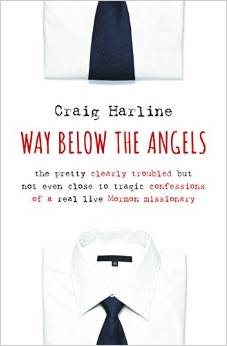Craig Harline, Way Below the Angels: The Pretty Clearly Troubled but Not Even Close to Tragic Confessions of a Real Live Mormon Missionary
This may be the most painful book I have ever read.
Which kind of painful, you ask? Well, it's a little hard to describe, but let's call it a tender, commiserative sort of a pain, stemming from Harline's ability to do something that we almost never see done: to illustrate the immense internal burdens that not-all-that-apocalyptic-when-you-really-think-about-it external circumstances can create.
Seriously: this is not a book about genocide, child abuse, starvation, or POW camps. It's a book about a middle-class American kid who went on a mission to Belgium in the 1970s with too-high expectations and had to figure out how to trudge through days filled with difficult companions, rain, and no baptisms. But I think it is the very banality of the external experience weighed against the crisis of the internal one that I found so compelling. After all, you can read an (excellent) book like Unbroken and think: that was amazing, and it has nothing to do with my life. But you read Way Below the Angels and think: this is me--a kicked-over anthill on the inside, even when things are really not all that bad on the outside. I haven't served a mission, but the internal struggles that Harline describes are an all-too-real reflection of the extreme angst that most people (most people, right? It isn't just me, right?) wrestle with internally. And until Mormons develop a mental casserole, mental priesthood blessing, and mental visiting teaching visit, the problem is that you are all alone in there when you face this kind of struggle.
Harline provides an unusual kind of balm in the form of an epically raw and genuine account of his mission. This isn't a tell-all expose (pretty much the worst sin a missionary commits in this book is writing a letter on a not-P day). This isn't, obviously, a missionary hagiography, either. Instead, it is real life, lived in the mundane middle. We get very few missionary narratives like this. Which is precisely why the young Elder Harline was able to begin his mission with such an absurdly optimistic expectation for what his mission would be like. (At the risk of thread-jacking my own post: this is the problem we have with a lot of rhetoric in Mormon culture. We only hear the glory stories from happy RMs, happy mothers, happy marriages, etc. We don't usually hear the hard stories, and so if it is hard for us, the difficulty is compounded by the fact that we think we are alone and must be doing something wrong.) Throughout the book, he describes immense (internal) struggles along with a scant, precious few rays of light that end up revealing an awful lot about God and, I think, ultimately make this a faith-promoting book. (Faith-promoting in the real world of real life. Not faith-promoting in the sense of perpetuating a faith-promoting-but-ultimately-unsustainable view of life.)
And he's funny, so that helps. When you can't get past the front matter without laughing, you suspect that he (and you) will be OK in the end. The book can be a little over-written, a little trying-too-hard-to-write-cleverly and be funny. But sometimes it is brilliant, like when he compares the examination of his motives to the public dissections in old Dutch paintings. And when he recounts personal inspiration that, fittingly, comes in the most mundane of ways. And the fact that, nearly forty years later, he still felt somewhat traumatized by his mission made me feel . . . less lame about the minor problems that I fret about today. The real battles in life (for some of us anyway) are huge, if small, and Harline's book is a welcome exploration of them.
Review copy provided by publisher.
Cross-posted to Times and Seasons.

1 comment:
Huh. Never heard of this one, but it sounds absolutely fascinating. I'm definitely going to add it to my TBR list. Thanks for the compelling review!
Post a Comment